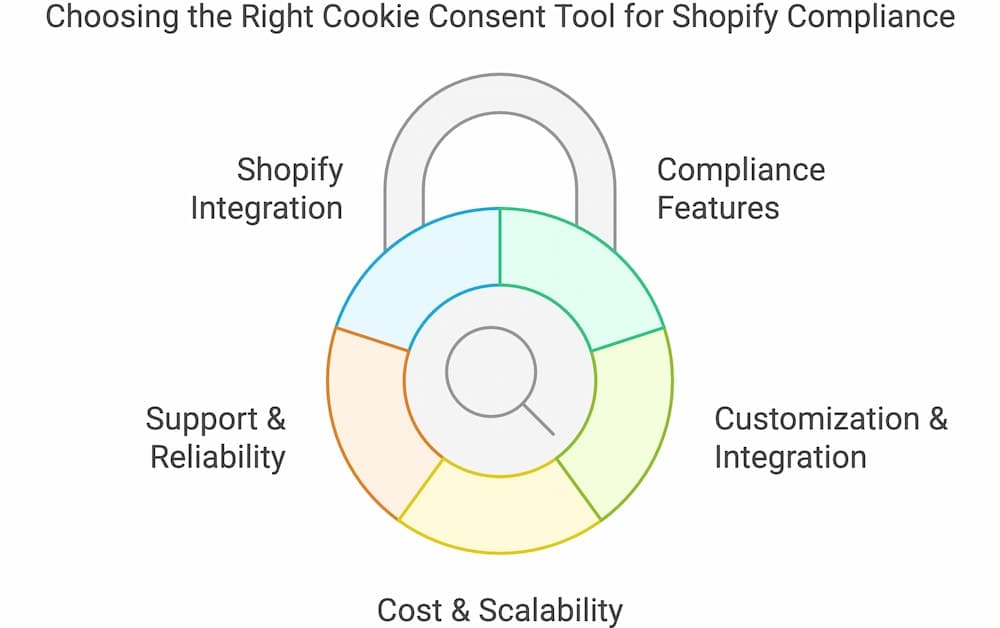Introduction
Managing cookie consent is critical to running an online store in today’s digital landscape. As privacy regulations like the General Data Protection Regulation (GDPR) and CCPA become increasingly stringent, Shopify merchants must navigate the complexities of obtaining user consent for cookie usage.
Selecting the right cookie consent tool ensures compliance and builds customer trust. A compliant Shopify cookie banner should seamlessly integrate with your Shopify store, provide customization options, and offer a user-friendly experience.
In this article, we’ll guide you through the process of choosing the best cookie consent tool for your Shopify store. We’ll discuss key features to look for, considerations for legal compliance, and tips for enhancing user trust.
What is Cookie Consent in Shopify Stores?
The cookie consent banners in Shopify stores are a regulatory compliance feature designed to manage user consent for cookie usage. It ensures that e-commerce platforms adhere to data privacy laws like GDPR and CCPA by informing users and obtaining their consent before tracking.
Understanding the importance of Shopify cookies is crucial for store functionality and compliance with privacy laws. Various cookie tools can help shop owners manage user consent effectively, ensuring a smoother customer experience and compliance with legal requirements.
Cookie consent tools enable Shopify merchants to:
Inform Users: Provide clear information about the types of cookies used in the store and their purposes.
Obtain Consent: Allow users to opt-in or opt-out of non-essential cookies, giving them control over their data.
Manage Preferences: Users can manage their cookie preferences and withdraw consent at any time.
By implementing a robust cookie consent solution, Shopify stores can demonstrate their commitment to privacy compliance and build trust with their customers. This helps avoid legal repercussions and enhances the overall user experience.
What are Cookies and How Do They Work?
Cookies are small pieces of data stored in a web browser to remember user preferences or login information. They play a crucial role in enhancing the user experience by providing personalized content and recommendations based on user interests. For Shopify stores, cookies are indispensable in ensuring a seamless user experience, from remembering login details to tracking shopping cart items.
Cookies help websites function more efficiently by storing information about user interactions. For instance, they can remember a user’s region selection, ensuring that the site displays content relevant to that location. This personalized approach improves user satisfaction and boosts engagement and conversion rates.
However, the use of cookies must be handled with transparency and user consent. As privacy regulations become more stringent, Shopify store owners must ensure that they inform users about cookie usage and obtain their consent before tracking their data. This helps comp comply with legal requirements and builds trust with customers, showing that their privacy is a priority.
How to Select the Ideal Cookie Consent Tool for Your Shopify Store
Selecting the appropriate cookie banner tool for your Shopify store involves strategically evaluating compliance requirements and user experience. A key feature to look for is a customizable consent popup that facilitates compliance with GDPR. The tool should adhere to international privacy standards, offer flexible design options, and integrate effortlessly with Shopify, ensuring effective consent management without impeding store operations.
A cookie banner tool lets users design compliant banners that adhere to privacy regulations while also offering functionality for visitors to manage their consent preferences effortlessly.

Step 1: Identify Key Features Required for Compliance
Choosing the right cookie consent tool begins with ensuring it includes a GDPR-compliant cookie banner that meets the demands of current privacy laws like the GDPR and CCPA. These regulations necessitate tools that can efficiently handle user consent and manage data access rights. The selected tool must be equipped to uphold these standards, thereby protecting your business from potential legal repercussions.
Essential Compliance Features
A robust cookie consent solution should encompass several pivotal features designed to meet privacy law requirements. Consider the following critical elements:
Detailed Consent Options: Ensure the tool offers users nuanced control over cookie preferences—allowing them to accept or decline specific types of cookies such as essential, analytics, and marketing.
Real-Time Cookie Monitoring and Control: Opt for a tool that actively monitors cookie activity, providing immediate categorization and control over cookies to ensure compliance from the outset of any user interaction.
Comprehensive Consent Documentation: Maintaining a thorough record of user consent interactions is crucial. A reliable tool should facilitate this, enabling you to verify and demonstrate compliance effectively during any regulatory reviews.
Customization and Integration
Beyond legal compliance, the tool should allow for significant customization of the cookie consent interface, ensuring it aligns with your store’s branding and enhances user engagement.
Tailored Consent Interfaces: Search for tools that offer extensive customization capabilities, enabling you to modify the consent banner’s appearance to fit your brand’s visual style while maintaining clarity in the consent process.
Effortless Shopify Compatibility: Ensure the tool integrates seamlessly with Shopify, supporting its native apps and features to maintain operational fluidity without disrupting current workflows.
By focusing on these features, you can select a cookie consent tool that complies with regulations and strengthens user engagement and trust. As privacy laws evolve, having a tool that can adapt and update in accordance with these changes is vital for ongoing compliance and customer assurance.
Step 2: Evaluate User Experience and Customization Options
Cookie banners play a crucial role in the effectiveness of a cookie consent tool, as they largely depend on the user experience they offer. A tool that integrates smoothly into your Shopify store’s operations while providing an intuitive interface can significantly boost compliance and user satisfaction.
Customization Capabilities
The ability to tailor the consent tool’s appearance to your store’s unique branding is crucial. This enhances your site’s visual harmony and strengthens customer interaction by offering a consistent user experience.
Visual Consistency: Choose a tool that provides extensive options for adjusting the visual elements, such as colors and layout. This ensures that the consent interface integrates seamlessly with your store’s existing design, reinforcing your brand’s identity.
Responsive Design: Opt for features that allow you to customize consent messages and options effectively, ensuring clarity and relevance to your audience while maintaining simplicity in interaction.
Intuitive User Interface
A straightforward interface is essential to ensure ease of use for both store owners and customers, facilitating efficient consent management.
Simplicity for Store Owners: The tool should offer an easy-to-use dashboard that simplifies the process of managing consent preferences and monitoring compliance. Features like clear navigation and user-friendly data management tools are beneficial.
Clarity for Customers: Ensure the tool provides a clear and concise consent process for customers. Options should be easily accessible and understandable, empowering users to manage their data preferences confidently.
By focusing on these elements, the cookie consent tool can enhance compliance and user engagement, fostering customer trust and loyalty.
Step 3: Consider Pricing and Scalability
In selecting Shopify cookie consent tools for your store, a keen understanding of cost efficiency and expandability is crucial. The chosen solution should not only align with your budgetary constraints but also offer a feature set that meets the evolving demands of your business. This balance ensures a sustainable compliance approach without sacrificing essential capabilities.
Cost Efficiency Evaluation
Begin by meticulously assessing the pricing model of potential tools, considering both upfront expenses and future financial commitments. Various tools feature different pricing structures—some provide tiered services based on store size or transaction volume, while others may include a base price with optional premium add-ons.
Value Proposition: Examine the value offered at each pricing level. Determine if higher-cost plans deliver significant advantages, such as enhanced analytics or comprehensive support, that justify the investment.
Transparency and Adaptability: Investigate any additional fees, such as those for installation or extra users. Ensure that the pricing model allows flexibility to adjust plans as your business scales.
Expandability Considerations
Scalability is vital for accommodating the growth of your Shopify store. As your operations expand, your compliance tools must be capable of evolving in response to increased demands.
Handling Increased Capacity: Opt for a tool that seamlessly accommodates rising website traffic without compromising performance. This ensures a consistent user experience and uninterrupted compliance as your store attracts more visitors.
Adaptive Compliance Solutions: Select a solution that receives regular updates and can incorporate emerging features over time. This flexibility is essential for keeping pace with changing privacy laws and technological advancements.
Choosing a tool that effectively balances cost and scalability will support your store’s long-term success and compliance objectives.
Step 4: Review Customer Support and Reliability
When selecting a cookie consent tool for your Shopify store, evaluating the quality of customer support and the ability to manage cookies is essential. This ensures that any technical issues can be swiftly addressed, minimizing downtime and maintaining compliance. A reliable support system can greatly enhance your experience with the tool, providing peace of mind and operational efficiency.
Diverse Support Options
Effective customer support should offer multiple communication channels to accommodate various needs and preferences. Selecting a tool that provides a comprehensive array of support options, such as dedicated support lines and detailed online resources is beneficial.
Responsive Assistance: Look for tools that guarantee prompt responses, ensuring that any issues affecting your store’s compliance can be resolved quickly.
Expert Guidance: The support team should deliver expert advice and solutions, drawing on a deep understanding of privacy compliance and technical intricacies.
Ensuring Tool Reliability
The reliability of a cookie consent tool is pivotal for continuous compliance with privacy regulations. Choose a tool that has a strong reputation for stability and consistent performance, supported by a commitment to regular enhancements.
Proactive Updates: Select tools known for proactively updating their features and compliance protocols, reflecting the latest developments in privacy laws.
User Feedback and Reputation: Investigate customer reviews and industry reputation to assess the tool’s reliability and effectiveness. Feedback from other Shopify merchants can provide valuable insights into the tool’s real-world performance.
By prioritizing responsive support and a dependable tool, you can enhance your Shopify store’s compliance strategy, ensuring a smooth experience for both you and your customers.
Step 5: Analyze Integration with Shopify Ecosystem
Incorporating a Shopify cookie consent tool into your Shopify store requires careful consideration of its integration capabilities. Ensuring the tool aligns with Shopify’s infrastructure is crucial for preserving the operational flow of your store. This integration should facilitate a cohesive interaction between the tool and Shopify’s native applications, enhancing both store functionality and user experience.
You can find various cookie consent tools on the Shopify App Store, which simplifies the process of compliance and enhances customer trust through transparency in data collection.
Compatibility with Shopify
Examine the tool’s ability to integrate effortlessly with your store’s existing systems. The ideal solution will offer a straightforward setup, minimizing the need for extensive technical support, and should seamlessly sync with Shopify’s operations. This ensures continuous compliance tracking and maintains the integrity of user consent data.
User-Friendly Setup: Select a tool that provides a simple installation process, often available through Shopify’s app marketplace, which allows for quick deployment even for those with limited tech skills.
Efficient Data Synchronization: Ensure the tool features real-time synchronization with Shopify’s backend, enabling precise management of user preferences and consent records.
Additional Compliance Tools
Consider tools that extend beyond basic functionality, offering supplementary features to bolster your store’s compliance framework. These additions can provide comprehensive data protection, enhancing your overall privacy management strategy.
Comprehensive Privacy Management: Look for solutions that offer advanced features like automated data reporting, risk assessments, or detailed privacy dashboards, which can significantly enhance compliance efforts.
Robust Security Enhancements: Tools emphasizing strong security protocols, such as state-of-the-art encryption and secure data storage, offer additional layers of protection, safeguarding both customer and store data effectively.
By focusing on these integration aspects, you ensure that your chosen cookie consent tool complements the Shopify ecosystem and strengthens your store’s approach to privacy management with enhanced compliance capabilities.
Tips on Selecting Cookie Consent Tools

1. Prioritize Regulatory Alignment and Adaptability
Selecting a cookie consent tool requires a focus on tools that align with a diverse set of global privacy laws. Ensuring your chosen solution addresses various regulatory frameworks helps maintain your Shopify store’s legal integrity across different regions. This strategic alignment upholds legal obligations and enhances consumer confidence in your data practices.
Regulatory Breadth: Seek out tools covering a wide range of compliance requirements, facilitating smooth transitions across legal landscapes. This breadth ensures your store can easily adjust to new privacy directives without significant operational disruptions.
Dynamic Customization: Prioritize solutions that offer robust customization capabilities, allowing you to adapt consent interfaces to meet specific regulatory and brand requirements. This dynamic approach enhances user interaction by aligning the consent process with your store’s unique identity.
2. Anticipate Future Developments and Innovations
When choosing a cookie consent tool, consider the tool’s ability to evolve with future regulatory changes and technological advancements. The digital environment is constantly shifting, presenting new privacy challenges and opportunities. A proactive mindset ensures your store remains agile and prepared for future developments.
Growth Capacity and Evolution: Opt for solutions that offer the flexibility to grow with your business. This approach ensures your compliance framework can accommodate increasing demands and shifts in privacy regulations.
Embrace Technological Innovations: Choose tools that stay at the forefront of technological advancements, such as improved data protection features and innovative consent mechanisms. Keeping up with these innovations ensures your store employs the latest solutions to maintain robust privacy practices and protect customer data effectively.
Conclusion
By incorporating these considerations, your approach to selecting a cookie consent tool will be strategic and forward-thinking. Focusing on regulatory alignment and future readiness ensures your Shopify store maintains a strong compliance posture while adapting to the ever-evolving digital landscape.
By carefully evaluating these key aspects—compliance features, user experience, cost-efficiency, reliability, and Shopify integration—you can confidently select your store’s ideal cookie consent tool. Investing in a robust solution safeguards your business from legal repercussions and demonstrates your commitment to protecting customer privacy. If you’re looking for a comprehensive, user-friendly tool to make your Shopify store compliant with GDPR and other privacy regulations, try Pandectes GDPR Compliance, and let us help you navigate the complexities of consent management.



